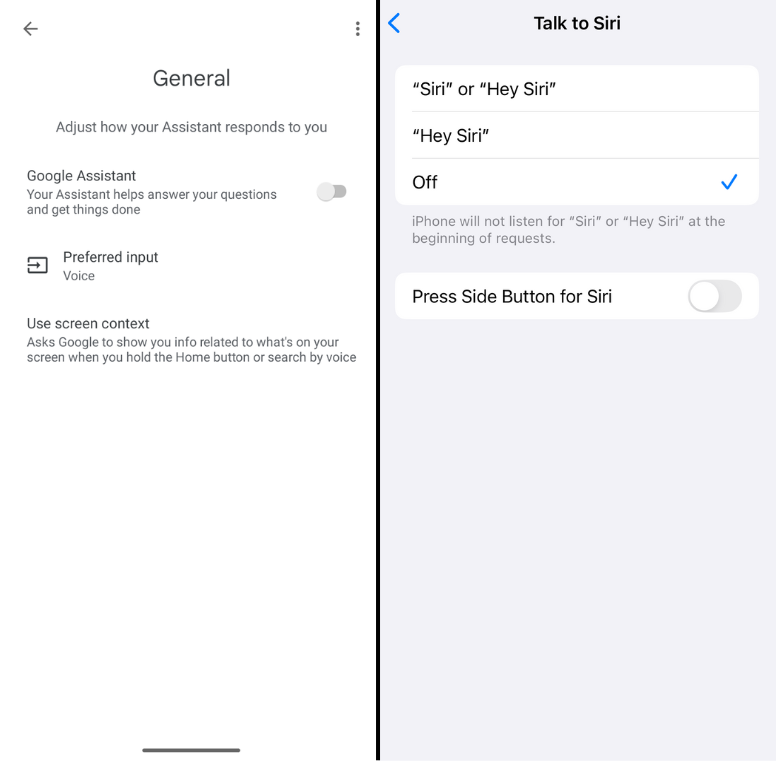Is your phone secretly listening to you? Here’s an easy way to find out
If you’re a smartphone owner—and chances are that’s everyone reading this—you’ve probably encountered an eerie, but all too common scenario: One day you’re talking about a random topic while your phone is next to you and the following day you notice ads start popping up related to that same topic. It’s unsettling. How do these ads know what you were talking about? Your smartphone may be the culprit. Every smartphone has its built-in microphone constantly turned on in order for the virtual assistant to hear your voice commands. So, could it be that these devices are also secretly eavesdropping on your conversations in order to serve you ads? Here’s everything you need to know, plus a simple test to find out. How to find out if your phone is listening to you To test if your phone is listening to your conversations, start by openly discussing a unique topic that you’ve never searched for or discussed previously while your phone is turned on next to you. It’s crucial that this be something that isn’t related to your usual interests or search queries. Spend a day or two discussing this topic out loud with your phone next to you the whole time. Make sure that you don’t search about this topic on any of your devices—not just your phone. You can also try talking about specific things related to this topic. For example, if you’re discussing traveling to Spain, you can discuss learning Spanish or what the best restaurant is for paella in Madrid. During this time, pay close attention to the ads you’re served while online—ads on social media feeds, websites you visit, apps you use, and those on your smart TV if you have one. Then, if you begin seeing ads about the topic you chose to discuss, chances are you’ve confirmed the eavesdropping and caught your phone red-handed. What to do if you think your phone is eavesdropping Before you go taping over the microphone and camera on your phone or throwing it in a lake, there are a few less drastic things you can do to curb the potential eavesdropping. The first is to carefully review the app permissions on your device. It’s likely that you downloaded an app and allowed it to access your microphone without ever realizing it. Comb through the permissions for each app on your phone and limit apps that don’t need access to your microphone, camera, or location settings. Under the respective settings menus, you can turn off Google Assistant on Android phones or Siri on iOS devices to make sure they aren’t eavesdropping. Sam Singleton Next, clear the voice history and disable your phone’s digital assistant. Google, Siri, and Alexa are all very convenient, but might be actively (and passively) recording everything you say without you knowing. Just last year, 404 Media reported that a third-party company named Cox Media Group (CMG), which offers “Active Listening” technology, was working with companies such as Amazon, Google, and Microsoft. While these companies have since denied using this technology to spy on phone users, the fact is that the capabilities exist and it’d be foolish to assume that companies wouldn’t take advantage of ways to more effectively advertise to consumers—after all, ads drive most of their revenue. Finally, while companies are the most likely source of eavesdropping, there is always the potential for hackers to exploit vulnerabilities on your device and take control of the microphone or camera as well. The best way to combat this is to make sure you always have the latest updates for both your phone’s OS and all of the installed apps. All of these steps will help cut off unwanted access to your phone’s microphone, but if you’re still unsure, there’s a simple solution. Just turn off your phone or leave it behind when you want to discuss private matters. It’s the best way to ensure your phone can’t hear you. If your phone isn’t listening, then how’s it getting your data? While the prospect of your phone constantly eavesdropping on your every conversation may be disconcerting, there are myriad ways that you could be divulging this same info without ever saying it out loud. Each smartphone is a veritable treasure trove of personal data for any and all apps to pull from. They are essentially mini-computers packed with sensors: gyroscopes, accelerometers, magnetometers, and just about any other -meter you can think of. The data collected from these sensors can provide a shocking amount of info about our routines, habits, and personalities. Everywhere you visit, other people you talk to or spend time with, lifestyle choices, and personal health data are just some of the metadata and telemetry—phone sensor data—collected by your phone. Not to mention all of the vast amounts of data you’ve already provided over the years to your apps and via Google searches. Your phone and the installed apps hoover up all of this data and send it off to third parties such as data brokers to be analyzed,

If you’re a smartphone owner—and chances are that’s everyone reading this—you’ve probably encountered an eerie, but all too common scenario: One day you’re talking about a random topic while your phone is next to you and the following day you notice ads start popping up related to that same topic. It’s unsettling. How do these ads know what you were talking about?
Your smartphone may be the culprit. Every smartphone has its built-in microphone constantly turned on in order for the virtual assistant to hear your voice commands. So, could it be that these devices are also secretly eavesdropping on your conversations in order to serve you ads? Here’s everything you need to know, plus a simple test to find out.
How to find out if your phone is listening to you
To test if your phone is listening to your conversations, start by openly discussing a unique topic that you’ve never searched for or discussed previously while your phone is turned on next to you. It’s crucial that this be something that isn’t related to your usual interests or search queries.
Spend a day or two discussing this topic out loud with your phone next to you the whole time. Make sure that you don’t search about this topic on any of your devices—not just your phone.
You can also try talking about specific things related to this topic. For example, if you’re discussing traveling to Spain, you can discuss learning Spanish or what the best restaurant is for paella in Madrid.
During this time, pay close attention to the ads you’re served while online—ads on social media feeds, websites you visit, apps you use, and those on your smart TV if you have one. Then, if you begin seeing ads about the topic you chose to discuss, chances are you’ve confirmed the eavesdropping and caught your phone red-handed.
What to do if you think your phone is eavesdropping
Before you go taping over the microphone and camera on your phone or throwing it in a lake, there are a few less drastic things you can do to curb the potential eavesdropping.
The first is to carefully review the app permissions on your device. It’s likely that you downloaded an app and allowed it to access your microphone without ever realizing it. Comb through the permissions for each app on your phone and limit apps that don’t need access to your microphone, camera, or location settings.

Under the respective settings menus, you can turn off Google Assistant on Android phones or Siri on iOS devices to make sure they aren’t eavesdropping.
Sam Singleton
Next, clear the voice history and disable your phone’s digital assistant. Google, Siri, and Alexa are all very convenient, but might be actively (and passively) recording everything you say without you knowing.
Just last year, 404 Media reported that a third-party company named Cox Media Group (CMG), which offers “Active Listening” technology, was working with companies such as Amazon, Google, and Microsoft.
While these companies have since denied using this technology to spy on phone users, the fact is that the capabilities exist and it’d be foolish to assume that companies wouldn’t take advantage of ways to more effectively advertise to consumers—after all, ads drive most of their revenue.
Finally, while companies are the most likely source of eavesdropping, there is always the potential for hackers to exploit vulnerabilities on your device and take control of the microphone or camera as well. The best way to combat this is to make sure you always have the latest updates for both your phone’s OS and all of the installed apps.
All of these steps will help cut off unwanted access to your phone’s microphone, but if you’re still unsure, there’s a simple solution. Just turn off your phone or leave it behind when you want to discuss private matters. It’s the best way to ensure your phone can’t hear you.
If your phone isn’t listening, then how’s it getting your data?
While the prospect of your phone constantly eavesdropping on your every conversation may be disconcerting, there are myriad ways that you could be divulging this same info without ever saying it out loud.
Each smartphone is a veritable treasure trove of personal data for any and all apps to pull from. They are essentially mini-computers packed with sensors: gyroscopes, accelerometers, magnetometers, and just about any other -meter you can think of. The data collected from these sensors can provide a shocking amount of info about our routines, habits, and personalities.
Everywhere you visit, other people you talk to or spend time with, lifestyle choices, and personal health data are just some of the metadata and telemetry—phone sensor data—collected by your phone. Not to mention all of the vast amounts of data you’ve already provided over the years to your apps and via Google searches.
Your phone and the installed apps hoover up all of this data and send it off to third parties such as data brokers to be analyzed, sold, and regurgitated back to you in the form of personalized ads.
So, even though you may not have talked about or searched that trip to Spain, your phone may have intuited what you were thinking and come to the conclusion on its own based on the data it collected. Maybe your friends were searching for Spanish AirBnBs while next to you, or maybe you downloaded Duolingo and started learning Spanish recently, or maybe your shopping trends show a recent uptick in the amount of saffron and jamón you’ve been buying.
Any and all of this metadata could be the reasoning for the eerily relevant ads you’re seeing. And while your phone could truly be listening in, it might just be the unspoken data you’re sharing in other ways that gives you away.















































































